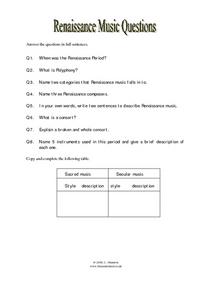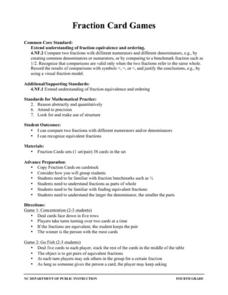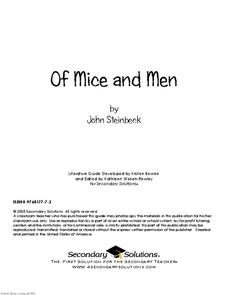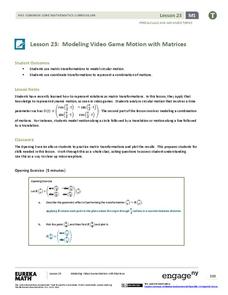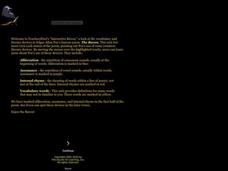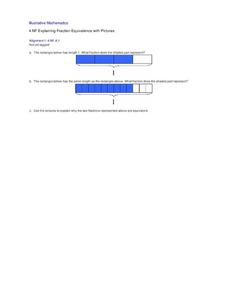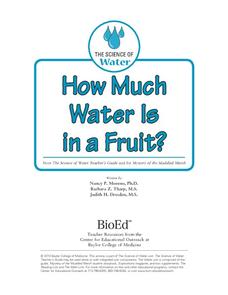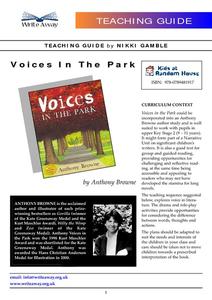PBS
Make a Balloon Globe
"We've got the whole world in our hands," is what your students will be singing after completing this fun geography activity. Using the included templates for the seven continents and a balloon, they create their very own globes.
Illustrative Mathematics
Finding Areas of Polygons, Variation 1
An exercise in finding the area of polygons by decomposing into triangles and composing into rectangles is the focus of this resource. Make several copies of the worksheet for each participant. Ask learners to use colored pencils to...
Howard Hughes Medical Institute
Measuring Biodiversity in Gorongosa
Take your biology class' understanding of biodiversity to a whole new level! Ecology scholars use data to calculate three different diversity indices based on the organisms in the Gorongosa National Park. The four-part activity uses an...
Curated OER
Renaissance Music Questions
Add a comprehension resource to a unit on the Renaissance or music of the Renaissance period. Middle schoolers answer eight comprehension questions and complete ten additional questions in order to fill out a crossword...
Savvas Learning
Verbs: Future
As part of their study of future tense verbs, language learners engage in activities, read fables, and sing songs. The 25-page packet includes detailed lessons, worksheets, graphic organizers, and answer keys for assessments.
North Carolina Department of Public Instruction
Fraction Card Games
Have fun with fractions in a math card game activity! Cut out the fraction cards and use them to reinforce fraction concepts, including common denominators, parts of a whole, and equivalent fractions.
Secondary Solutions
Of Mice and Men: A Literature Guide
Whether you are planning on using Of Mice and Men for whole-class reading or as a selection for literature circles; whether you are new to John Steinbeck's novel, or it has long been a part of your curriculum, you...
National External Diploma Program Council
Measuring in Metrics
Practice measuring skills with a 10-question worksheet that challenges scholars to measure lines using centimeters and inches.
Illustrative Mathematics
Operations on the Number Line
A different way to look at integers is on this number line with variables in place of numbers. Learners are to look at different expressions and describe why they think the answer would be positive or negative, depending on the location...
California Academy of Science
Earthquakes and Tectonic Plates
Here is a comprehensive package in which middle schoolers learn about types of seismic waves, triangulation, and tectonic plate boundaries. Complete vocabulary, colorful maps, and a worksheet are included via links on the webpage. You...
Santa Ana Unified School District
The Power of Point of View
Sometimes a whole story can change based on the perspective of the person telling it. Practice identifying and analyzing point of view in various reading passages and writing assignments with a language arts packet, complete with Common...
EngageNY
Modeling Video Game Motion with Matrices 2
The second day of a two-part lesson on motion introduces the class to circular motion. Pupils learn how to incorporate a time parameter into the rotational matrix transformations they already know. The 24th installment in the 32-part...
Curated OER
Find 1
Extend your class's ability to represent unit fractions on a number line with this challenging worksheet. Given two number lines, one labeled with zero and 1/4, the other with zero and 5/3, students must accurately locate the number one...
Curated OER
Comparing Fractions with the Same Numerators, Assessment Variation
Have your class demonstrate their ability to compare fractions with this short multiple-choice assessment. Using the fractions 9/8 and 9/4, the students first make comparisons using both words and the greater than/less than signs. Next,...
Illustrative Mathematics
Explaining Fraction Equivalence with Picture
Visual models are a great tool for demonstrating the concept of equivalent fractions. Given two pictures, young mathematicians first identify each fraction and then write an explanation for why they are equivalent. Use as a guided...
Mathematics Assessment Project
Estimating Length Using Scientific Notation
Would you rather have a million dollars or 1 x 10^6 dollars? To find the answer to this question, class members first complete an assessment task converting numbers between decimal notation and scientific notation. They then take...
Mathematics Vision Project
Module 6: Trigonometric Functions
Create trigonometric functions from circles. The first lesson of the module begins by finding coordinates along a circular path created by a Ferris Wheel. As the lessons progress, pupils graph trigonometric functions and relate them to...
Cornell University
Atomic Bonding
Explore the connection of surface area to bonding within atoms. Learners complete lab investigations to model changing surface area with different sizes and concentrations of atoms. A flour fireball demonstration follows the labs to...
Baylor College
How Much Water Is in a Fruit?
Compare the volume of an orange to the volume of liquid that can be extracted out of it. Also compare the mass of an apple before and after it has been dried out. In both of these activities, children find that there is an appreciable...
Write Away!
Voices In the Park
Explore the impact a narrator's point of view has on a story with a reading of the children's book, Voices in the Park by Anthony Browne. Written in four different voices, the story is told and retold from different perspectives to...
Curated OER
Hot Spots
Keep an eye on progress with reading and vocabulary using pink and green sticky notes. This resource describes how to set up the sticky note system so that learners can note difficult passages, and teachers can track ability.
Scholastic
Bingo Lingo
Word roots can be great fun when part of a game! Practice a variety of different roots with this nicely put-together bingo game that comes with plenty of instructional ideas.
Virginia Department of Education
The Modern Model of Atomic Structure
The difference between atomic mass and atomic number can be confusing for some young chemists. Help your class better understand the concepts by allowing them to sketch an atom on paper and then discuss their experience. Upon completion...
DiscoverE
Build a Straw Bridge
Build teamwork skills while building a bridge. Scholars work together in groups to create a bridge out of 20 straws and tape. There is a minimum span length of 25 centimeters, but otherwise, let creativity run wild.



